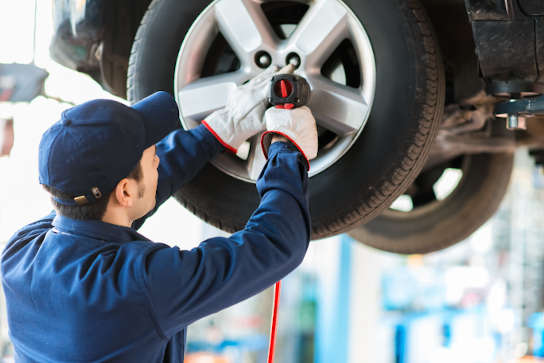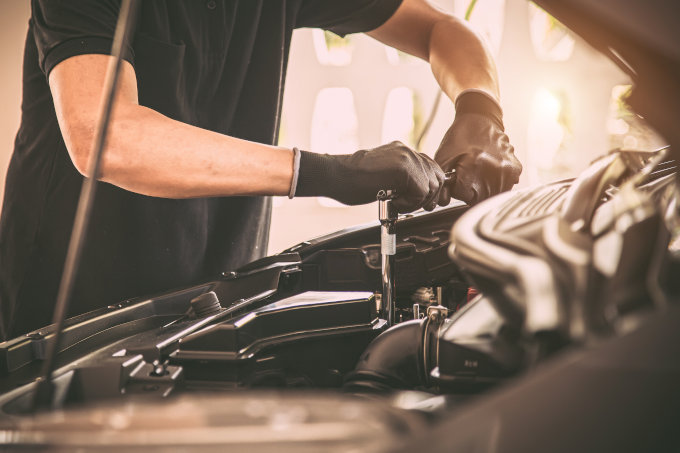The coronavirus pandemic has affected everyone. During the past few
weeks, daily life has been impacted by business closures, shelter-in-place orders, social distancing practices, parents homeschooling their children, and a variety of other measures working to counteract the spread of COVID-19. From healthcare workers to schools to employees and small business owners, the world is rapidly adjusting to deal with the effects of this deadly virus.
While you should limit your activity and exposure as much as possible during this time, what if something necessary in your life — like your car — malfunctions? Car repair shops are considered essential businesses, which means that they are still open and available to help. Here's what you should know about how to remain safe when servicing your car during a pandemic.
Essential Vs. Non-essential Businesses
These phrases you've likely heard on the news, but it can be confusing as to precisely what it means. An essential business is one that provides vital services to keep communities functioning. Car repair shops are considered among these essential businesses allowed to remain open during stay-at-home or shelter-in-place orders. Each state decides its own "essential" businesses, but most agree that grocery stores, banks, gas stations, laundromats, and trade services like plumbing and electrical work make the cut. Examples of non-essential businesses include bars, barbershops, hair and nail salons, malls, and many other small businesses.
Should You Have Your Car Repaired?
There are a few factors to consider when you're thinking about having your car repaired during a health crisis, especially in areas with a shelter-in-place or stay-at-home order:
Is this necessary? Sometimes appointments pop up on our calendar because "it's time" to have it done. During a national health crisis, some routine appointments may be deemed less necessary than others. Talk to your mechanic about maintenance, repairs, and recalls during a national emergency and what would be safest for you and your community.
Will my actions put myself and others at higher risk? In a pandemic, the entire system relies on everyone — the ill and the healthy — to make smart decisions to avoid impacting those around them. If you are sick or are experiencing any symptoms that you could pass on to another person while having your car repaired, please wait to get those repairs done. Likewise, if you are in a higher risk group, delaying repairs is advised even if you're experiencing no symptoms. Making a community-minded decision during this time is never convenient, but it's an excellent way to do your part in trying to flatten the curve.
Can I do it at home? There are a few safety maintenances items you can check at home, such as your fluids, battery, and tires. You can also change your windshield wipers out.
When Do I Need to Go to the Repair Shop?
Car repair shops are essential businesses because they help to resolve safety concerns. You should never hesitate to go to a car repair shop for a serious problem, recall notice, or safety concern.
Car problems you should never ignore:
- Check engine light comes on
- Overheating
- Noises while driving
- Squealing brakes
- Odd smells (especially sweet or burnt)
- Leaking fluids of any sort
- Shaking or vibrations
- Recall notices
If you experience any of these issues or have other anxieties about the performance of your car, here are a few tips as to what to do:
Call the Repair Shop Ahead of Time
Before you decide to head into the repair shop, give the shop a ring to make sure they're open and to get more information about your potential repair. Anything they can tell you over the phone can help reduce the risk of being exposed — or exposing someone else — to COVID-19. Some questions to ask can include:
- Is this repair crucial for a safe, functioning vehicle?
- Can you tell me more about the precautions you're taking during the COVID-19 outbreak to keep guests and staff safe and healthy?
- Have your hours of operation been affected by the epidemic?
- Will repair times be longer?
- Can I send you a picture or video of the car to help with a diagnosis?
- Can you invoice me through email?
- Can I pay over the phone?
- Will wait times be longer?
Plan for the Repair
When You Decide to Drop Off
Having transportation to and from the repair shop to continue the practice of social distancing is important and frequently required. Auto repair shops and dealerships are asking customers to use curbside drop-off services for their cars rather than wait inside to help better mitigate the spread of COVID-19. Safer customer experiences such as no-contact key exchanges, and enhanced services that include car sanitizing and no-touch paperwork and payment, are becoming standard practices in the auto repair industry.
Additional Resources
Both the CDC (Center for Disease Control) and WHO (World Health Organization) are excellent sources to learn more information about health and safety to ensure you're doing your part to help curb the COVID-19 outbreak.
AAMCO has more than 50 years of experience servicing and repairing transmissions and has worked on more than 20 million vehicles. Customers rely on us for:
- Quality workmanship
- Superior service
- Best warranty coverage available
- Trustworthy, honest service
AAMCO Centers of Southern California and surrounding areas represent trust, quality, and value. Call us today!

 Schedule Appointment
Schedule Appointment















